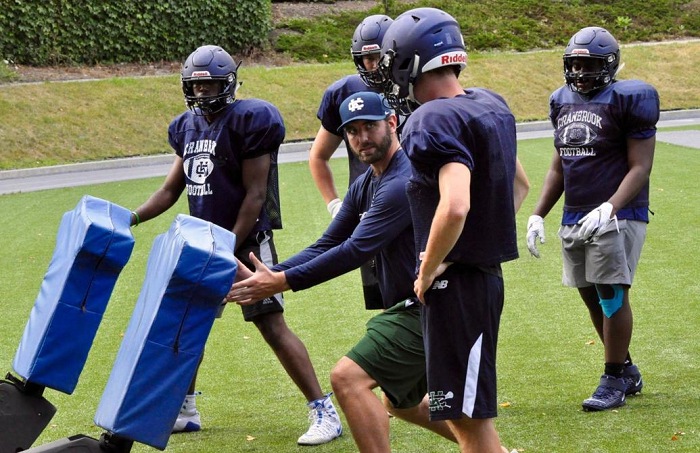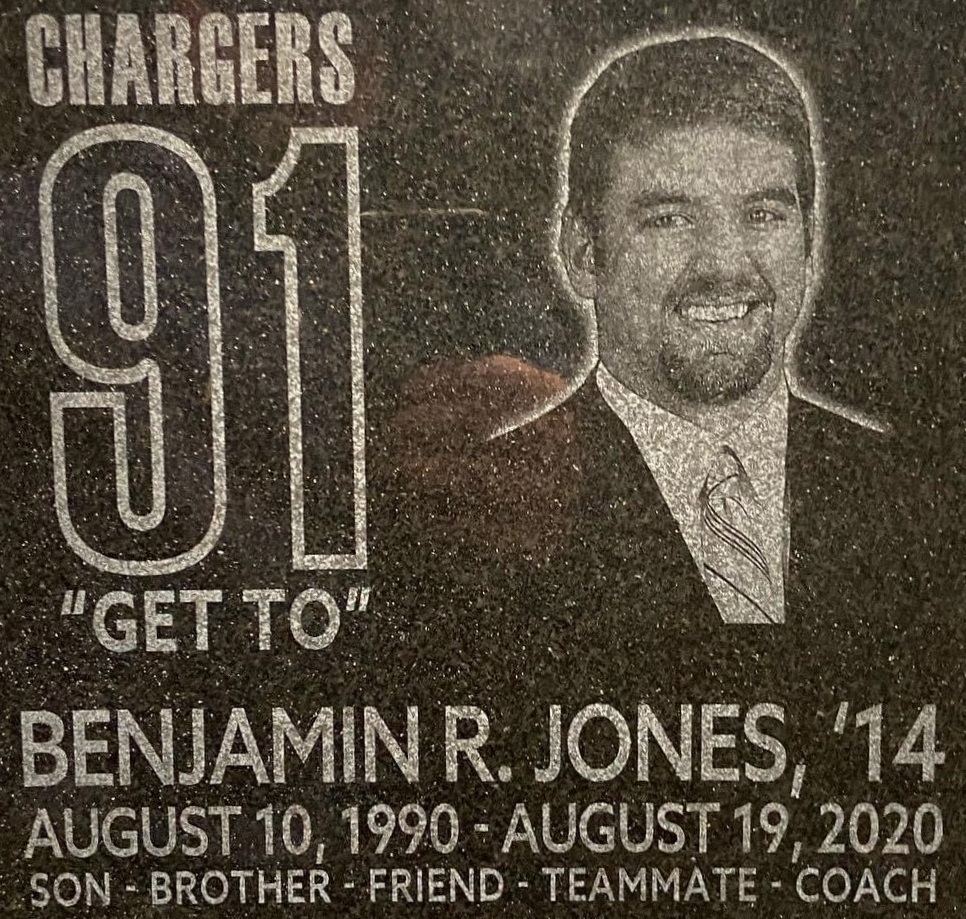
Let's Not Forget These Winning Coaches
December 15, 2015
By Ron Pesch
Special for Second Half
Buried deep within the MHSAA’s list of coaches with 200 career football wins is the name Oscar Johnson. Sharp eyes will note that Johnson began his coaching career in 1925 – 90 years ago.
Following graduation from Western State Normal School (today, Western Michigan University) in Kalamazoo, Oscar E. Johnson coached two seasons at Mount Pleasant High School before moving on to Muskegon Heights in 1927. Known by his nickname, like most from the time period, “Okie” coached multiple sports including football, basketball and baseball. After 37 years (1927 to 1963) and six mythical gridiron championships (as well as three Class A basketball titles), he retired and moved to Baldwin.
During a teacher’s strike in 1979, Johnson, now in his 70’s, came out of retirement to coach Baldwin’s football team for four contests, earning three wins against a single loss. In 40 seasons, Johnson’s teams posted 209 victories against 106 defeats and 28 ties.
In 1975, his was the lone name that would have appeared on the MHSAA’s list of coaches with 200 football wins.
In 1980, Bill Maskill, a graduate of Michigan State University and head coach for six seasons at Sheridan, then Galesburg-Augusta for 29 years, was the second to join the list. Jack Castignola, who started his coaching career in Ohio before becoming varsity coach at Monroe Catholic Central and then Trenton, was added to the list in 1981.
They were followed by Dick Mettlach, long of Crystal Falls and that school’s successor, Crystal Falls Forest Park, Jack Streidl who led Plainwell for 37 seasons, and Dick Soisson, who coached for a combined 41 seasons at Owosso St. Paul, Kalamazoo St. Augustine and Kalamazoo Hackett. Each posted his 200th win in 1984. Leo “Smokey” Boyd, who coached 40 years at Standish-Sterling, Saginaw Sts. Peter and Paul and Saginaw Nouvel, notched his 200th win in 1985, becoming only the seventh coach to accomplish the task in 90-plus years of high school football in Michigan.
Only two additional names were added over the next five years. Walt Braun, long of Marysville, joined the exclusive group in 1986. Al Fracassa, who spent a combined 46 seasons coaching at Royal Oak Shrine and Birmingham Brother Rice and turned down the chance to join Muddy Waters’ coaching staff at MSU in 1980, picked up his 200th win in 1988. That brought the list to nine total.
Twenty five years later, the list totals 58 names. So what changed?
Of course, it was the addition of the MHSAA football playoffs, which debuted in 1975.
A look at two coaches helps illustrate the issue.
Fracassa, the list’s current leader in all-time wins with 430, took 29 seasons to tally his first 200 victories. It took only 23 more seasons for him to gain the next 200. Farmington Hills Harrison’s John Harrington took 24 years to total 200 wins, but picked up his 400th after only 20 more.
Between 1960, Fracassa’s first season, and 1988, Fracassa’s teams played an average of 8.30 games a season. Between 1970, Herrington’s first year and 1993, the year of his 200th, his teams averaged 9.64 games per season.
Between 1988 and 2011, when Fracassa won his 400th game, his teams played an average of 11.61 games a season. Between 1994 and 2013, Herrington’s 400th, his teams played an average of 11.09 games per year. Fracassa’s teams compiled 68 victories in the MHSAA postseason. Herrington’s teams lead the state with 87 victories in the state playoffs.
Simply put, with the arrival of the postseason, it became easier to get to 200.
While no one would debate the accomplishments of any of the 58 gentlemen on the list, all but a few benefit from a baseline that few others who coached only 40 years before them were unlikely to reach.
Of course, those previous years included an amazing array of mentors. In hindsight, perhaps the list should include a mark for coaches from who assemble 150 varsity wins during the regular season only.
Johnson, and many others on the current list, certainly fall within such a category. But so would people like Ted Sowle, who, according to extensive research by former state historian Dick Kishpaugh, compiled a combined 171-47-10 mark between 1937 and 1963 as varsity coach at Grant, Algonac, Cathedral Prep in Erie, Pa., and Grand Rapids Catholic Central. At the time of his retirement from coaching in 1963, he ranked second in the state on the career wins list, behind only Johnson.
Ray Rynberg, a Grand Rapids Union and Central Michigan graduate, began his coaching career at Cedar Springs in 1939. After 12 years, he stepped away from the coaching ranks to pursue a degree in school administration from the University of Michigan. In the fall of 1955 he returned to the sidelines at Grant. He remained for 21 years, compiling a record of 189-62-9 (including seven unbeaten seasons) surpassing Sowle on the list upon retirement following the 1975 season.
Elmer Engel, who is honored in Bay City with his name attached to the city’s beautiful football stadium, also would appear on such a list. A three-year starter at the University of Illinois, Engel arrived in 1950 and installed the T-formation. He worked the sidelines for the Wolves through the 1972 season, compiling a 165-34-8 record and mythical Class A state titles in 1958, 1965, 1967, 1969 and 1972 according to the Associated Press polls ranking the state’s top teams.
Traverse City’s Jim Ooley led the Traverse City Trojans to a 164-56-4 regular season record (and a 179-60-4 record overall). Muskegon’s C. Leo Redmond led the Big Reds to a 156-29-13 record and six mythical Class A state titles between 1923 and 1946.
Certainly, there are others, many long-forgotten by most to the sands of time, who would qualify for the list. But who are they?
Incredibly successful coaches, like Flint Northern’s Guy Houston, would still fall shy. Playing in the incredibly tough Saginaw Valley Conference, Houston’s teams posted a remarkable 148-41-13 mark in 24 seasons as head coach of the Vikings. Nick Annese, who rolled up a 55-29-2 mark (including 38 straight victories) in 10 seasons at New Lothrop, then led Corunna to a 91-32-3 mark over 14 seasons but falls several games short.
So will many other of the state’s more well-known names, like Lloyd Carr, best known for his years at the University of Michigan, (who served as an assistant at Detroit Nativity and Belleville, before becoming head coach at Westland John Glenn for a few years), University of Nebraska’s Bob Devaney (who spent years 14 years coaching in Birmingham, Keego Harbor, Saginaw, and Alpena) and Colorado’s Bill McCartney (who assisted under his brother Tom at Detroit Holy Redeemer, then served as varsity football and basketball coach at Dearborn Divine Child). All moved on to the college game as assistants before reaching 150 high school wins.
Nick Annese’s son, Tony, who coached at Montrose, Ann Arbor Pioneer, Jenison and Muskegon tallied 169 regular season wins (and 195 victories overall) at the prep level before moving on to the college ranks at Grand Rapids Community College, then Ferris State University.
Can you name others, missing from the list of 200-game winners, with 150 varsity victories in the regular season? If so, contact me at the e-mail address below.
 Ron Pesch has taken an active role in researching the history of MHSAA events since 1985 and began writing for MHSAA Finals programs in 1986, adding additional features and "flashbacks" in 1992. He inherited the title of MHSAA historian from the late Dick Kishpaugh following the 1993-94 school year, and resides in Muskegon. Contact him at [email protected] with ideas for historical articles.
Ron Pesch has taken an active role in researching the history of MHSAA events since 1985 and began writing for MHSAA Finals programs in 1986, adding additional features and "flashbacks" in 1992. He inherited the title of MHSAA historian from the late Dick Kishpaugh following the 1993-94 school year, and resides in Muskegon. Contact him at [email protected] with ideas for historical articles.
PHOTOS: (From left) Longtime Bay City coach Elmer Engel with a player from the 1968 Bay City Central yearbook, legendary Grant coach Ray Rynberg from the Muskegon Chronicle and championship-winning coach Jim Ooley of Traverse City.

Jones' Motto Inspires 'Get To' Foundation's Work to Provide Opportunities
By
Tom Kendra
Special for MHSAA.com
October 4, 2023
Ben Jones always had the same, simple message, even if it was 100 degrees and sunny or 35 degrees and raining sideways, and whether he was playing for a powerhouse like Muskegon Catholic Central or coaching a program trying to establish itself at Bloomfield Hills Cranbrook Kingswood.
 “We get to play football today,” Jones would say, as many of those around him were complaining and grumbling.
“We get to play football today,” Jones would say, as many of those around him were complaining and grumbling.
It was never “have to” for Jones, but always “get to.”
Jones, who was about to start his second year as head coach at Cranbrook, had his life tragically cut short by a drunk driver who crashed into his vehicle as he was traveling home from work in Detroit on Aug. 19, 2020. He was just 30 years old.
While Jones is gone, leaving a hole as large and painful as the 6-foot-2, 260-pound frame he carried as a tight end in his senior year at Hillsdale College, that “Get To” mentality is alive and well, and thriving and growing – thanks in large part to the efforts of his football teammates from Muskegon Catholic and later at Hillsdale.
The Get To Foundation, a 501(c)3 non-profit organization, was formed in Jones’ honor and has grown exponentially in less than three years, providing grants to sports organizations and scholarships to student-athletes.
“There is a core group of about 10 of them that have worked on (the foundation), and it’s been amazing,” said Theresa Jones, Ben’s mother, who with her husband Bruce has worked with the foundation. “It started small, and then it caught fire.”
The president of the foundation is Tim Hornak, Jones’ best friend and teammate in the trenches at both Muskegon Catholic and Hillsdale. Hornak returned to deliver a pre-game speech before the Crusaders’ home game on Sept. 15 against Kalamazoo United, where he talked about the man who is the inspiration behind the rapidly-growing Get To movement.
“You don’t have to, you get to – that simple difference can change your lives,” said Hornak, who teamed with Jones when both were seniors to help the Crusaders to a 14-0 record and the Division 8 championship in 2008. “You get to play football tonight and continue the tradition that started here in the 1950s.
“You get a chance to line up and play a great game with your best friends.”
Inspired by Hornak’s words and Jones’ legacy, the Crusaders downed Kalamazoo United 27-7 that night, the team’s second-straight win after an 0-2 start, which put them back in the Division 8 playoff picture.
 A tailgate party was held before the game as a fundraiser for the Get To Foundation, and it happened to coincide with the 15th anniversary of the Crusaders’ 2008 championship team – arguably one of the best teams in the school’s storied history. MCC has won 12 state championships, trailing only Farmington Hills Harrison in state playoff history.
A tailgate party was held before the game as a fundraiser for the Get To Foundation, and it happened to coincide with the 15th anniversary of the Crusaders’ 2008 championship team – arguably one of the best teams in the school’s storied history. MCC has won 12 state championships, trailing only Farmington Hills Harrison in state playoff history.
The phrase “get to,” according to Hornak, goes back to the whiteboard in the MCC locker room his sophomore year and perfectly captures Jones’ approach to life and to football, whether his team was unbeaten like at MCC or struggling like the Chargers did just after he and Hornak graduated.
Jones, who wore No. 62 at MCC, was a two-way starting lineman who also played on the Crusaders’ 2006 championship team as a sophomore. His best friends on the team were the Hornak twins, Tim and Jon, whose father Mike was an assistant coach.
After his funeral service on Aug. 24, 2020, Jones’ hearse made a stop at MCC’s Kehren Stadium on the way to the cemetery, taking a lap on the track around Mike Holmes Field.
He went on to play on three teams which won or shared Great Lakes Interscholastic Athletic Conference titles at Hillsdale, where he wore No. 91 and played tight end and H-back.
“He had an inner self-confidence that you could tell right away when talking to him,” said Hillsdale coach Keith Otterbein. “He was very positive. He encouraged his teammates.”
Jones graduated from Hillsdale in 2013 with a degree in financial management and a minor in mathematics, moved to Royal Oak and took a job as a portfolio manager and financial planner at Schwartz & Co. Investment Advisors.
In his free time, he worked as an assistant varsity football coach at Cranbrook from 2015 to 2018, before being elevated to head coach in 2019 at the age of 28.
One of his first actions as head coach was getting Cranbrook football T-shirts printed with the message “Get To” on the back. Jones guided the Cranes to a 6-4 record and a Division 4 playoff berth in what would prove to be his only season as head coach.
 He died nine days before Cranbrook’s scheduled season opener in 2020, which ended up being delayed six weeks due to the COVID-19 pandemic.
He died nine days before Cranbrook’s scheduled season opener in 2020, which ended up being delayed six weeks due to the COVID-19 pandemic.
In the immediate aftermath of Jones’ shocking death, the Hornak brothers and other former teammates vowed to do something to honor Ben and to help out his family. Out of that mission, the Get To Foundation was born.
Get To has awarded scholarships for the past three years. In 2023 alone, the foundation awarded $16,000 in scholarships to 22 student-athletes from around the state.
In addition, Get To has awarded $55,000 in grants to 17 organizations – including $3,000 to the Eaton Rapids High School football program for new shoulder pads and helmets and $2,500 to the Detroit Tigers Foundation’s Gloves for Kids program.
The next event on the foundation’s busy calendar is a speech by best-selling motivational author Jon Gordon at Lawrence Tech University on Oct. 17.
The foundation’s board has trademarked the phrase “Get To” and hopes to continue to grow the organization’s size and scope – in a way mirroring how big and impactful Ben’s life could have been if it wasn’t cut short.
For more information or to make a donation, go to the organization’s website at www.gettofoundation.org.
The relentless efforts of Ben’s ex-teammates to keep his memory alive means the world to his parents, as well as his two younger siblings – Alissa, a standout swimmer at Hillsdale who is now the school’s assistant women’s swimming coach; and Nate, who also played football for the Chargers and is now a foreign currency trader for Barclay’s, based in New York City.
Theresa Jones said coming together with all of Ben’s closest friends for Get To Foundation events has been a continuous blessing for the family.
“Every time we have an event for the foundation, it’s all of Ben’s friends and family members dressed up and having a good time,” his mother said. “It always feels like Ben’s wedding reception that he never got to have.”
 Tom Kendra worked 23 years at The Muskegon Chronicle, including five as assistant sports editor and the final six as sports editor through 2011. E-mail him at [email protected] with story ideas for Muskegon, Oceana, Mason, Lake, Oceola, Mecosta and Newaygo counties.
Tom Kendra worked 23 years at The Muskegon Chronicle, including five as assistant sports editor and the final six as sports editor through 2011. E-mail him at [email protected] with story ideas for Muskegon, Oceana, Mason, Lake, Oceola, Mecosta and Newaygo counties.
PHOTOS (Top) Ben Jones is shown before the 2008 Division 8 championship game at Ford Field during his senior year at Muskegon Catholic Central. The Crusaders defeated Crystal Falls Forest Park, 40-0. (Middle) Jones works with his linemen during his first year as head coach at Bloomfield Hills Cranbrook Kingswood in 2019. (Below) A plaque honoring Jones has been placed in the tunnel leading from the home locker room to the football field at Hillsdale College. (Top photo by Tim Reilly. Additional photos courtesy of the Get To Foundation.)

